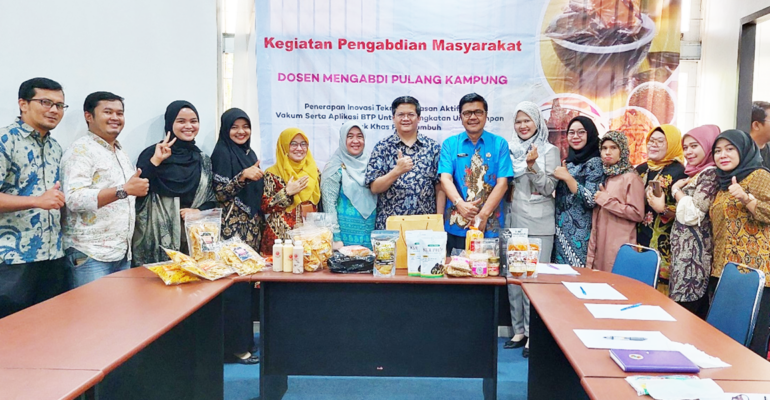IPB University Expert Explains Proper Product Preservation Strategy to Payakumbuh MSMEs

Two IPB University lecturers shared their knowledge in Payakumbuh City, West Sumatra through the Lecturer Mengabdi Innovation programme. They are Prof Nugraha Edhi Suyatma and Dr Dwi Yuni Hastati who held a technical guidance (bimtek) for micro, small and medium enterprises (MSMEs) of Payakumbuh souvenir products.
In collaboration with the Payakumbuh City Cooperative and MSME Office, the technical guidance was carried out in order to improve process technology, the use of food additives (BTP) and proper packaging techniques. This step is important so that the typical souvenirs of Payakumbuh City become durable and more durable so that their market reach is wider.
Prof Nugraha provided knowledge on various strategies on how to preserve the right target products and packaging techniques. “Different products, different ways of preservation,” he explained during the technical guidance held at the Hall of the Cooperative and MSME Office of Payakumbuh City.
He gave an example, in Payakumbuh, there are still many gelamai MSME business actors who use sodium benzoate for preservation purposes. According to him, this is not appropriate because gelamai generally already has water activity (Aw) of less than 0.75.
“With the characteristics of gelamai which has a product pH of more than 4.5, benzoate will not be active as a preservative. Moreover, the microbes that grow in gelamai are moulds, not bacteria,” explained this IPB University expert from the Faculty of Agricultural Technology (Fateta).
Prof Nugraha explained, gelamai preservation can be done without preservatives as long as the cooking is sufficient to reach Aw around 0.6. In the IPB University Lecturer Mengabdi programme last year, it has been proven that gelamai products processed to Aw ≤ 0.6 can last up to one month without using preservatives.
“By using vacuum packaging techniques and oxygen absorbers, gelamai products can last up to 3 months,” he added.
Prof Nugraha further said, if gelamai is produced in a conventional way, the right preservative is a combination of potassium sorbate and terrsier butyl hydroquinone (TBHQ). The sorbate will function to inhibit the growth of mould/mold, while TBHQ will function to prevent rancidity due to the oxidation process.
“Last year, this BTP combination was trialled and it was able to extend the shelf life of gelamai up to 3 months, although the texture became a bit hard due to starch retrogradation,” she said.
In this training, she also taught how to choose the right BTP and calculate the dosage according to the Food and Drug Administration (BPOM) regulations, not only for gelamai products, but also other perishable products.
“Hopefully gelamai MSME players will no longer use benzoate as a preservative because it is not effective,” he concluded.
The Chief of the Cooperative and SME Service Office of Payakumbuh City, M Faizal, really appreciated the IPB University lecturer team for coming back to Payakumbuh City as a place to devote their expertise to share knowledge with MSME players.
“The knowledge of the two IPB University experts is really needed by MSMEs in Payakumbuh City to be able to improve the quality of their products. Because, so far there are still many Payakumbuh MSME products whose packaging is not good, the model is not attractive and the shelf life is still relatively short,” said Faizal. (*/Rz) (IAAS/RUM)



